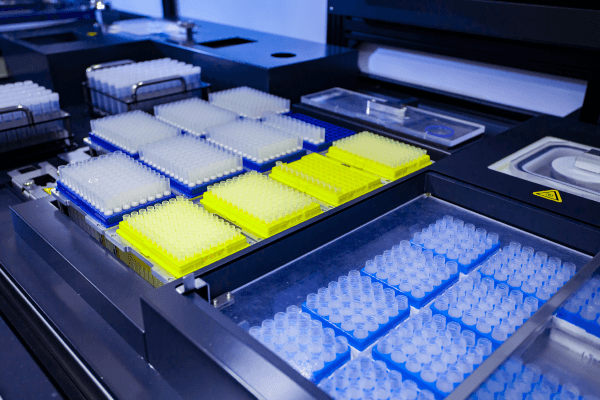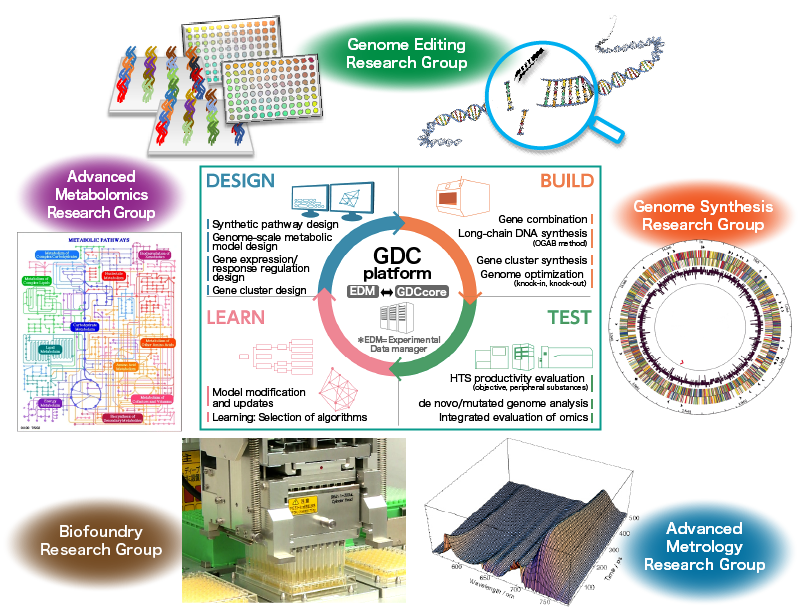Advanced Platform Technology Development Unit
Overview

Development and Provision of Platform Technologies That Give Rise to Breakthroughs
This development unit seeks to develop fundamental technologies that have the potential to serve as a collective life science platform for the future.
We are working to establish and provide diverse cutting-edge technology platforms, including genome editing and synthesis technologies for rewriting bio-designs, metabolome analysis for investigating the metabolites of living organisms all at once, measurement of the dynamic response of interfaces by frequency modulation atomic force microscopy (FM-AFM), which boasts the world's highest force resolution in a submerged environment, and biofoundries, which realize high-throughput life design by integrating computational technology and automation in addition to these technologies.

Research Groups
Advanced Metrology Research Group
- This research group deploys frequency modulation atomic force microscopy (FM-AFM), which boasts the world’s highest force resolution (10 Pico-Newton) in a submerged environment, for its research on measurement/evaluation of the dynamic response of the interface between soft materials and liquids with a spatial resolution of 0.1 nm.
This research group intends to utilize technology for visualizing not only the surface structures of soft materials but also the density distributions of liquids that abut them, thus applying this technology to the development of bio-based materials and lubricants. - We examine the functions of photosynthetic pigment-protein complexes by means of ultrafast fluorescence spectroscopies.
- We study a novel method for quantifying a small amount of functional group displayed on a plastic surface.
- Analysis of intermolecular interactions and global oscillations of molecular crystals and polymers by terahertz vibrational spectroscopy and quantum mechanical calculations.
Members
ONISHI Hiroshi (Professor), TOMINAGA Keisuke (Professor), MARUYAMA Tatsuo (Professor), and AKIMOTO Seiji (Associate Professor)
Genome Editing Research Group
- This research group is engaged in the development and improvement of technologies for modifying genomes with greater safety and capacity, including a “genome editing technique that does not cleave DNA” developed at Kobe University.
- With the aim of dealing with global climate change and realizing a sustainable society, this group combines the genome editing technique and cell culturing technique to develop technologies for safe, efficient and high-speed breeding of plants and microorganisms.
- From the elucidation of disease mechanisms to drug discovery, biopharmaceutical production, and gene therapies, this group is working on the development and application of technologies for efficiently manipulating genomes in a way that is applicable to the medical field.
Members
NISHIDA Keiji (Professor), NGUYEN Sao Mai (Research Associate), and MENTION Karen Valene Josiane (Research Associate)
Genome Synthesis Research Group
This research group is working on a technique for synthesizing designed genomic DNA, which is essential for establishing synthetic biology and metabolic engineering.
Furthermore, based on Kobe University’s proprietary technology of the Ordered Gene Assembly in Bacillus subtilis (OGAB) method, a long-chain DNA synthesis technique using Bacillus subtilis, this group is working on the automation of a series of processes from chemical synthesis of DNA to synthesis/refinement of long-chain DNA. This will allow for rapid, low-cost, high-throughput production of long-chain DNA, no matter how difficult it is to synthesize a given sequence.
Member
TSUGE Kenji (Invited Associate Professor)
Biofoundry Research Group
This research group is building a platform that combines Digital, Biotech, and Robotics by integrating computational technology for metabolic pathway design, enzyme selection and gene sequence design. The platform will also be utilized for high-throughput DNA synthesis/genetic engineering/genome editing technology, synthetic biology technology, and advanced metrology technology (including metabolome analysis).
Through optimally combining dry (information technology) and wet (biotechnology) element technologies, this group aims to develop the smart-cell creation technology that can be used for general-purposes.
Members
KONDO Akihiko (Professor), HASUNUMA Tomohisa (Professor), ISHII Jun (Associate Professor), TSUGE Kenji (Invited Associate Professor), and TOMINAGA Masahiro (Assistant Professor)
Please see entries under the Bio-based Fuel and Chemical Research Unit of the Members page for profiles of Professors KONDO Akihiko and HASUNUMA Tomohisa, and Associate Professor ISHII Jun.
Advanced Metabolomics Research Group
Metabolome analysis allows simultaneous analysis of intracellular metabolites, which yields data on characteristics and conditions of cells. At Kobe University, metabolome analysis is employed to identify metabolites that affect efficiency of bioproduction, select quality cells, and optimize culture conditions.
Other development topics include robotics for automating the pretreatment process that affects reproducibility of experiments, the Liquid Chromatographic Tandem Mass Spectrometric (LC-MS/MS) method with a high S/N ratio that supports a broad range of molecular species, a metabolic turnover analysis technique using time-of-flight mass spectrometry (CE-TOFMS), and user-friendly data processing techniques.
Members
HASUNUMA Tomohisa (Professor), KATO Yuichi (Assistant Professor), and TANAKA Kenya (Assistant Professor)
Please see entries under the Bio-based Fuel and Chemical Research Unit of the Members page for Professor HASUNUMA Tomohisa, and Assistant Professor KATO Yuichi.
